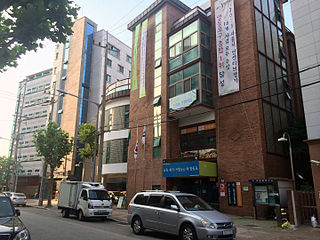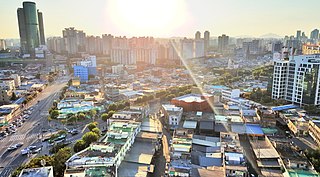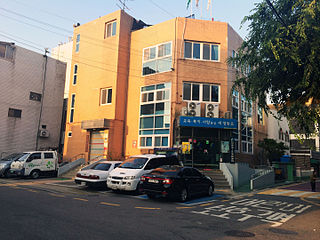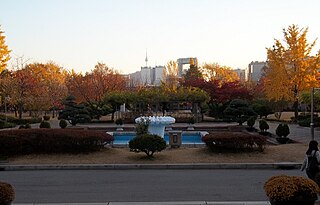
Yeongdeungpo District is an administrative district in southwest Seoul, South Korea. Although the origin of the name is uncertain, the first two syllables are thought to be from "yeongdeung" (靈登) or "divine ascent", a shamanic rite. The third syllable is "po", representing the bank of a river (浦), referring to the district's position on the Han River. The 2006 population was 408,819.

Yeouido is a river island on the Han River in Seoul, South Korea. It is Seoul's main finance, media, and investment banking district. It is 8.4 square kilometres (3.2 sq mi) large and has a population of 32,674 as of August 2023.

Guro District is a district of Seoul, South Korea, which was separated from Yeongdeungpo District on April 1, 1980. Located in the southwestern part of the city, where besides Yangcheon District and Geumcheon District Guro District has an important position as a transport link which contains railroads, land routes from the rest of Seoul to the south of the country. The Gyeongbu and Gyeongin railway lines connect Seoul to Busan and Incheon. In addition, Seoul Metropolitan Subway lines 1, 2, and 7, and major highways intersect in Guro District.

Dongjak District (Korean: 동작구) is one of the 25 gu (districts) that make up the city of Seoul, South Korea. Its name was derived from the Dongjaegi Naruteo Ferry, on the Han River which borders the district to the north. It was the 17th gu created in Seoul, after being separated from Gwanak District on 1 April 1980.

Dangsan-dong is a dong (neighborhood) of Yeongdeungpo District, Seoul, South Korea.
Singil-dong is a dong, neighbourhood of Yeongdeungpo-gu in Seoul, South Korea.

Dorim-dong is a dong (neighborhood) of Yeongdeungpo District, Seoul, South Korea.

Mullae-dong (Korean: 문래동) is a dong (neighborhood) of Yeongdeungpo-gu in Seoul, South Korea. The name "Mullae" comes from the neighborhood's old name, "Moraet-mal (모랫말)," which means "Sandy Village" in Korean.

Yangpyeong-dong is a dong, neighborhood of Yeongdeungpo-gu in Seoul, South Korea.

Sindorim-dong is a dong, neighbourhood of Guro-gu in Seoul, South Korea.
Ogin-dong (Korean: 옥인동) is a dong (neighbourhood) of Jongno District, Seoul, South Korea. It is a legal dong, administered under its administrative dong, Hyoja-dong, of which it covers the westernmost part, until the fortress wall of Inwangsan.
Dangju-dong is a dong (neighborhood) of Jongno District, Seoul, South Korea. It is a legal dong administered under its administrative dong, Sajik-dong.
Doryeom-dong is a dong (neighborhood) of Jongno District, Seoul, South Korea. It is a legal dong administered under its administrative dong, Sajik-dong. The name is originated from a governmental office named Doryeomseo in the region during the early period of Joseon dynasty.
Chebu-dong is a dong (neighborhood) of Jongno District, Seoul, South Korea. It is a legal dong administered under its administrative dong, Sajik-dong.

Hwa-dong is a dong (neighborhood) of Jongno District, Seoul, South Korea. It is a legal dong administered under its administrative dong, Samcheong-dong.
Gyobuk-dong is a dong (neighborhood) of Jongno District, Seoul, South Korea. It is a legal dong administered under its administrative dong, Gyonam-dong.
Haengchon-dong is a dong (neighborhood) of Jongno District, Seoul, South Korea. It is a legal dong administered under its administrative dong, Gyonam-dong.
Hongpa-dong is a dong (neighborhood) of Jongno District, Seoul, South Korea. It is a legal dong administered under its administrative dong, Gyonam-dong.
Chungjeongno-dong (Korean: 충정로동) is a dong (neighborhood) of Seodaemun District, Seoul, South Korea.
Siheung County, alternatively Shihŭng County was a county (gun) in Gyeonggi Province, South Korea. This county was abolished in 1989 as its one town(읍) of Sorae and two townships(면) of Gunja and Suam became Siheung City at the same time. Today's Siheung City area did not belong to Siheung County before 1914. The area rather was part of old Incheon or Ansan.











